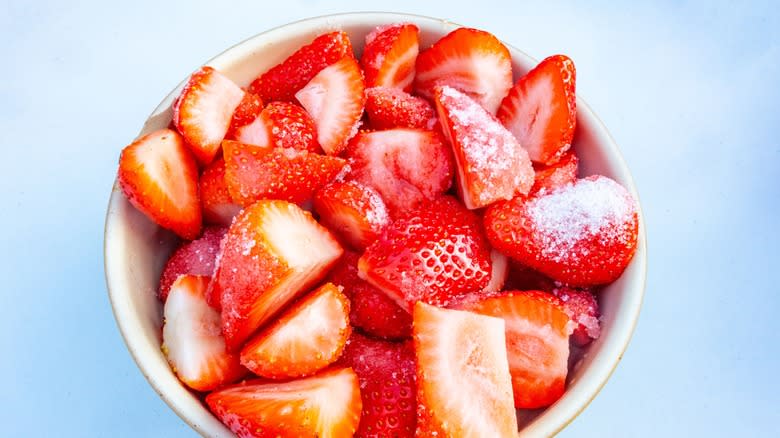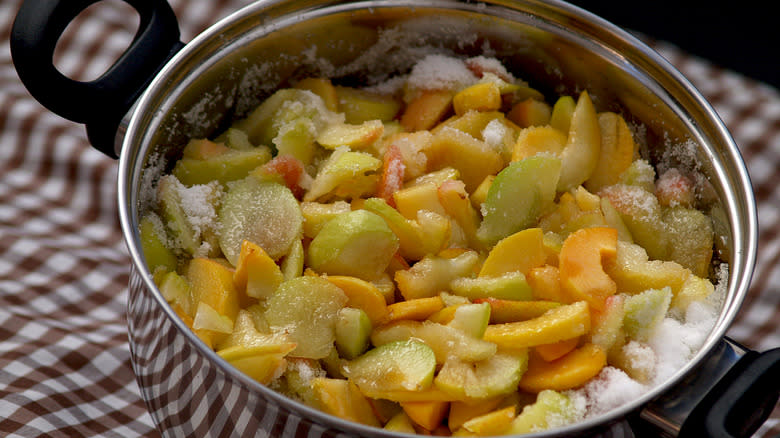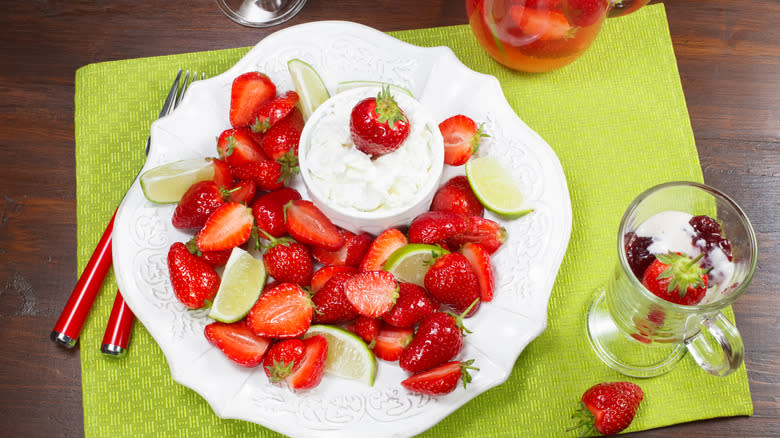How Long Should You Macerate Fruit For The Best Results?

If you want a fruit topping for a cake or ice cream sundae, you should consider macerating your fruit. Macerating is an excellent way to bring out the natural sweetness in fruit and make a delicious topper for a fruit salad or a a strawberry-Champagne granita. The process involves tossing your fruit with sugar or a sweet liquid like alcohol. This makes fruit juicy, softer, and sweeter, which is especially helpful if you need to mellow out tart raspberries or strawberries.
If you've never macerated fruit, you probably wonder how long it takes. After sprinkling sugar or liquid over the sliced fruit, you should notice the effects of maceration quite quickly. The fruit's texture will start to turn soft as it becomes saturated with the liquid or sugar (sugar, in particular, will dissolve and turn into a syrup). However, it takes a bit longer than a few minutes to really get the most out of maceration.
How long it takes to macerate fruit ultimately depends on the results you're looking for. If you want your fruit as soft and sweet as possible, consider macerating for a longer period, but if you want it to still have a bit of fresh firmness and a less sugary flavor, you can macerate for less than an hour. Let your fruit marinate for at least 30 minutes and up to overnight. However, this is only a general time frame -- the types of fruit you're macerating can affect how long the process takes.
Read more: Cake Hacks Every Baker Will Wish They Knew Sooner
The Science Behind Macerating Fruit

The science behind macerating fruit involves a process called osmosis. Osmosis is the transfer of liquids across a barrier, and occurs when a solution on one side of the barrier is at a lower concentration, and the other side is at a higher concentration. Osmosis attempts to equalize the concentrations on both sides by transferring liquid back and forth between this barrier.
When fruit is soaked in liquid or dissolved sugar, it weakens the fruit's cell walls -- the barrier in the osmosis process -- which causes them to soften. Osmosis then occurs, transferring the sweet liquid into the fruit while drawing the fruit's juices out. This is what makes that nice, tender, sweet fruit in a flavorful liquid. However, some fruits are tougher than others. Think of the consistency of a crisp pineapple slice versus soft strawberry. The firmer the fruit, the longer it will take to macerate.
If you're planning on macerating pineapple or another tougher fruit, then you should let it soak for longer. Fruits that can be more difficult to macerate include cranberries, plums, and cherries. Likewise, if you're planning on macerating dried fruit, then consider heating up the liquid or syrup you're using. This will help to speed up the process. No matter which fruit you use, keep an eye on your fruit and taste test it occasionally until you're satisfied.
What To Use To Macerate Fruit

You can macerate your fruit in a variety of liquids or in plain, white sugar, depending on the flavor profile you're chasing after. Liquids you can use include wines, liqueurs, vinegar, and juices. You can also mix spices and sweeteners into the liquid to change the overall taste of your fruit. Thicker substances like honey or syrup are also good for maceration, but plain sugar is by far the easiest way to go, and creates great results.
Sugar works in maceration by using the fruit's natural juices. Through the process of osmosis, the sugar draws out the natural juices from the fruit, which mingle with the sugar to form a syrup-like layer. Fruit macerated in sugar will not be as juicy as fruit soaked in a wine or another liquid, but you'll get a purer, natural taste. Brandy- or honey-macerated fruit can be delicious, but the fruit's flavor will change quite a bit. A less juicy and liquidy fruit mixture can also be boon for desserts like cakes, which might turn soggy under the weight of too much syrup.
Ultimately, whatever kind of sweetener or liquid you choose won't affect how long it takes for your fruit to macerate. Plan accordingly, and be mindful to not let your fruit sit for too long, or it might end up falling apart.
Read the original article on Daily Meal.

